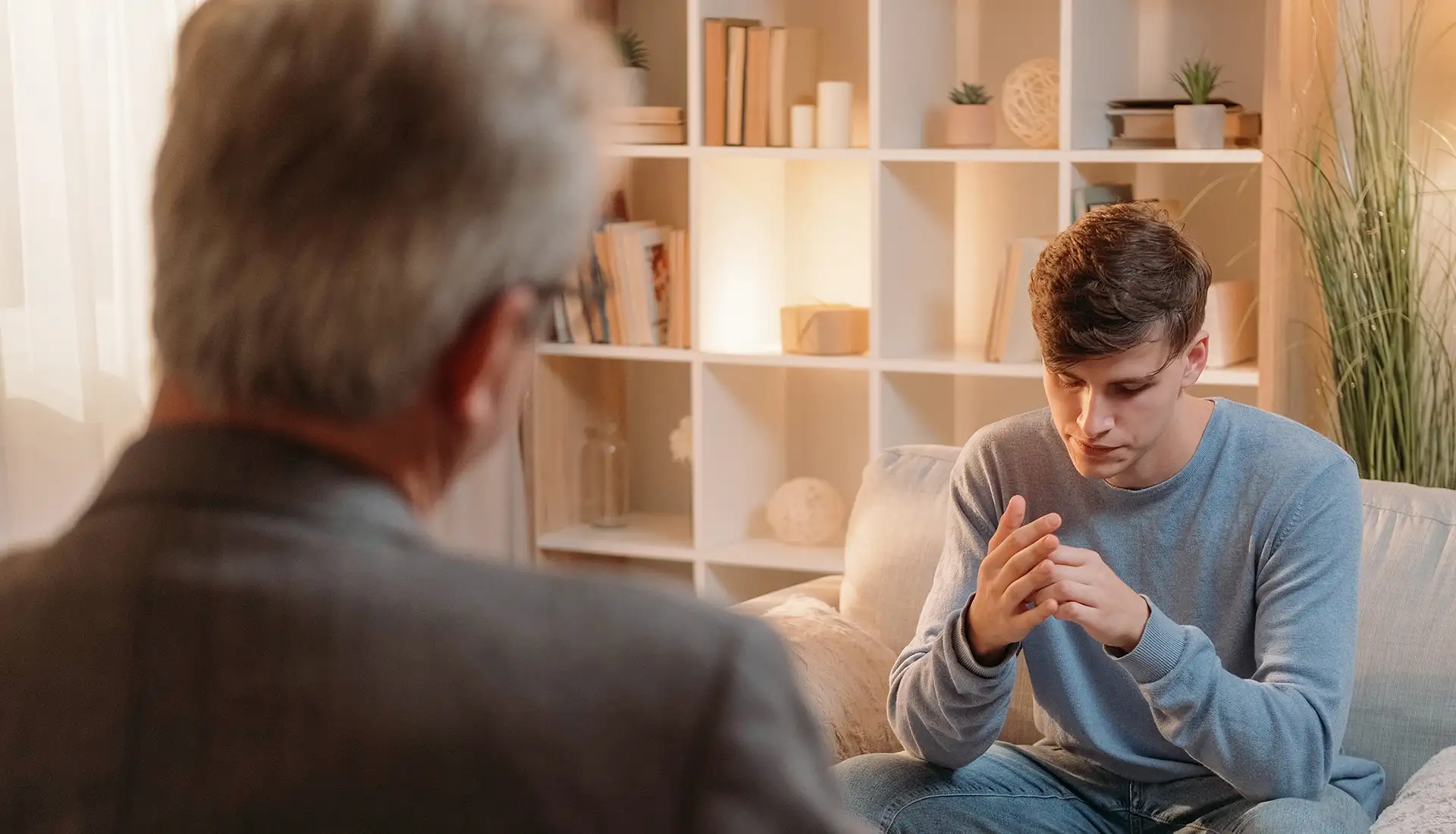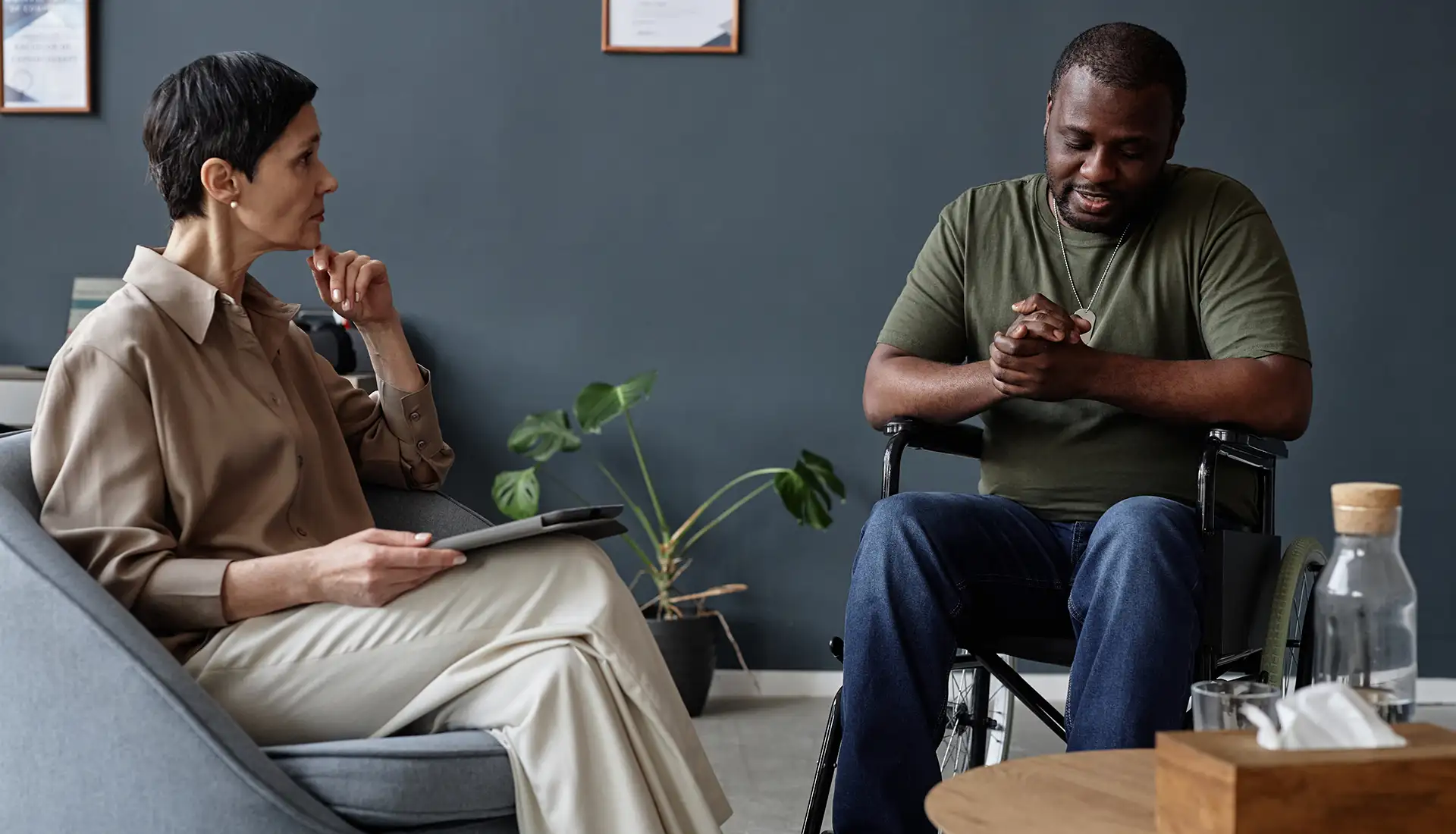Steps from the Green Line in Back Bay
OCD Treatment Service in Boston
Living with OCD and related disorders can be a struggle for many. It’s not a quirky need to keep your space tidy, but instead a compulsive disorder that can interrupt your ability to function. For some, OCD exhibits intrusive thoughts; for others, it’s damaging repetitive behaviors.
No matter how you experience your OCD, our psychiatry and psychology team of experts is here to help.



What is Obsessive Compulsive Disorder?
Obsessive compulsive disorder (OCD) affects children, college students, and older adults alike. Those with OCD and related disorders start to see symptoms as young as six years old, though it usually shows up in young adults the most.
OCD is characterized by obsessive thoughts and compulsive behaviors. It is more than just wanting to be neat or needing your space to stay tidy. Instead, those with OCD may experience:
- Persistent/obsessive thoughts: A persistent thought or obsession that repeatedly enters your mind. The thought is usually distressing and causes severe anxiety or even disgust.
- Repetitive behaviors: Obsessive, negative or intrusive thoughts are why some may feel the need to perform an action several times over (like turning off the oven), because their obsessive thought (the home burning down) repeatedly returns and takes over.
OCD sometimes occurs naturally, other times occurs due to trauma, and in women, it may occur during or just after pregnancy.
What Related Disorders Are There?
Obsessive compulsive disorder does not often exist on its own. Those with OCD often also experience related disorders, like the hair-pulling disorder known as trichotillomania.
The hair-pulling disorder is just one example. Those with OCD also tend to experience:
Body Dysmorphic Disorder (BDD)
- Body dysmorphic disorder occurs when your obsessive compulsive disorder focuses on your appearance. It might include excessive grooming, seeking out constant assurances, or even investing in semi-to-permanent changes in order. Essentially, with body dysmorphic disorder, you cannot stop thinking about your perceived flaws. Left unchecked, it can lead to devastating eating disorders like anorexia.
BDD by Proxy
Unfortunately, body dysmorphic disorder doesn’t just impact how you see yourself. In some cases, it may affect how you see others. This is known as BDD by proxy. Those who have it typically obsess over their children’s appearance, excessively groom them, and even hide them away due to their perceived flaws. Those with BDD by proxy need cognitive behavioral treatment, but more than that, the children who were subject to this behavior need response prevention and clinical services themselves.
Chronic Tic Disorder (CTD)
With chronic tic disorder, you have involuntary movement or verbal tics. This disorder is very similar to Tourette syndrome, but if you have CTD, you’ll only exhibit one type of tic (verbal or physical, not both).
Tourette Syndrome (TS)
With Tourette syndrome, you experience both verbal and physical tics.
Hoarding
Hoarding, or being unable to let possessions (even trash), is often a symptom of anxiety disorders like OCD or trauma. In extreme cases, the hoarding behaviors pose health risks to you, your children, or your neighbors.
Skin picking Disorder
Anxiety disorders can result in physical symptoms like a skin picking disorder. Skin picking can occur anywhere. You may compulsively pick at pimples, scabs, or even healthy skin. Skin picking, while rarely life-threatening, can leave sores, cause scars, and can get worse with stress.
Hair Pulling (Trichotillomania)
- Another similar disorder is trichotillomania or hair pulling. You may pull out your eyebrows, eyelashes, or scalp compulsively as a stress response.
Why are These Related Disorders Grouped Together?
While all different, these related disorders do have similarities. For one, they are all types of repetitive behaviors or even thoughts that follow along the pathways of OCD.
Evidence exists (though more research needs to be done to confirm this) that these related disorders share a common neurobiological basis. This means you might be genetically more likely to experience these related disorders if you live with obsessive compulsive disorder.
These disorders, even with a potential neurobiological cause, does not mean there is no hope. Our evidence based treatment and clinical services are designed to help you manage your co-occurring conditions with a combination of therapy, medication, and skills building. We combine a clinical and holistic approach to help children, young patients, and adults alike get the assessment and support they need to begin healing.
How We Treat OCD
OCD and its related conditions like body dysmorphic disorder are cared for with a range of treatment options by our renowned clinicians, including:
Cognitive Behavioral Therapy (CBT)
Cognitive behavioral therapy (CBT) is a popular and effective approach that helps patients identify the negative thought patterns that lead to obsessive actions. The goal of CBT is to help recognize the start of an anxiety attack and to walk away from the trigger.
Exposure and Response Prevention (ERP)
Exposure and response prevention is a type of cognitive behavioral therapy that focuses on slowly and gradually exposing yourself to what your fears focus on. With OCD, this can be something as seemingly small as reducing the number of times you have to check your oven is turned off before you leave the home.
Acceptance and Commitment Therapy (ACT)
ACT is another of the services we offer at our center for OCD. ACT works on helping you accept how you feel and think rather than berating yourself for it, as this can actually worsen symptoms.
Mindfulness-Based Stress Reduction (MBSR)
We may even offer MBSR, which is a mindfulness approach to help you manage your stresses in a healthy, holistic way.
All of the treatment and therapy options we provide at our center for OCD are research-backed. We believe that a combination of holistic health and psychiatry is necessary to help those with OCD manage their symptoms and anxiety, no matter their age.
PhD-Trained Clinical Research Associates and Therapists
At Back Bay Mental Health, you’ll have a clinical psychologist specializing in OCD working with you every step of the way. As our team includes psychiatrists, psychologists, and holistic health workers, you’ll have a rounded team available to help you address your OCD and related disorders in a safe, healthy, and supportive environment.
Our experts only use evidence-based treatments to help treat your OCD, body dysmorphic disorder, skin picking, and other obsessive compulsive traits and related conditions. We can even help you through substance use issues that have arisen in your efforts to self-medicate your anxiety concerns.
Access to Medication
Our team includes psychiatrists, which means our private practice can evaluate and even prescribe medication to our patients if need be. For OCD, for example, patients may be prescribed selective serotonin reuptake inhibitors (SSRIs). If you do not want medication, however, that is entirely up to you. We offer a range of therapy options, from group to individual therapy, alongside or instead of medical treatments for OCD.
Evidence-Based Treatment
We are a specialist Center for OCD providing evidence based treatment for adolescents, young adults, and professionals alike. With us, you’ll have access to evidence based treatments like exposure and response prevention, cognitive behavioral therapy (CBT), and medication. Our goal is to treat your OCD, related disorders, and address the underlying cause so that you build up the skills you need to live life to its fullest.
Can I Qualify for Treatment from an OCD Therapist in Boston, MA?
If you suspect that you have OCD or one of its related conditions, then get in touch with our Center for OCD and related disorders right here in Boston, Massachusetts (MA). Thanks to our psychiatry and psychology experts, You don’t need a diagnosis to get started with our practice.
We provide assessments and evaluations, helping you understand your condition rather than fear it. Once you have a diagnosis, we can then work on building up your support network with treatment options, as well as life skills and recommendations to help you regain your sense of confidence in yourself and the world.
Since you don’t already need a diagnosis to start getting support (in fact, we can still help you even if your symptoms don’t match up with OCD but something else), we recommend you come in and visit us if you experience any of these symptoms:
- Obsessive thoughts that interrupt your daily life
- A compulsion to continually perform actions, especially if it’s to avoid a perceived fear
- Repetitive and damaging behavior like skin picking or hair pulling.
- Negative and harmful obsession with your appearance
Even if you don’t fit the bill entirely for OCD, you may suffer from anxiety, trauma, or similar disorders that deserve treatment just as much. Our renowned clinicians are here to help you no matter what. As a private clinic, we can help you with self-discovery all the way to providing response prevention treatment, as needed.
What You'll Get at Our OCD Clinic in Boston
Back Bay Mental Health Center for OCD provides clinical treatment to a wide range of OCD patients. As a private clinic, you’ll have fast access to a clinical psychologist who can diagnose OCD and related disorders like skin picking so you can begin your healing journey.
We are also here to build a personalized patient care and treatment program just for you. With us, you’ll have access to therapists, exposure training treatments, medication, and support from your PHD therapists all the way to your group therapy peers.
We combine psychology and psychiatry, meaning you will have all the resources, training, services, and treatments you need to help with navigating life’s challenges, especially when you live with OCD.
The best part is that, as a private clinic, we can work fast. Get your first appointment quickly, and don’t worry about trying to fit in your treatment between life, school, or work. We are fully flexible so that you can start addressing your OCD and related disorders on your schedule.
Contact Our Team Today
We are a private clinic, so there is no waiting list. Instead, you can start your treatment today. All you need to do is contact our team, and we’ll book you in for your first session.
